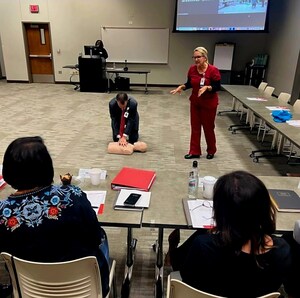New American Heart Association Survey Finds Heart Disease and Stroke Patients Face Significant Barriers in Obtaining Quality, Affordable Care
Patients Cite Affordability and Accessibility to Care as Top Concerns
WASHINGTON, Feb. 11 /PRNewswire-USNewswire/ -- A new American Heart Association survey substantiates that the need for health care reform has not gone away. Many heart disease and stroke patients are faring poorly under the current health care system, with nearly two-thirds citing affordability as the top concern of those suffering from cardiovascular disease. Ensuring the availability of insurance coverage and investing more in prevention ranked second and third, respectively.
"The survey should serve as a vivid reminder that too many Americans, including the insured and especially the underinsured, are simply overwhelmed by soaring medical expenses and inadequate coverage," said Nancy Brown, CEO of the American Heart Association. "Many of these issues and concerns would be addressed through meaningful and comprehensive health care reform - and that's why it is so critically important that Congress act this year."
According to the AHA survey, more than half of all cardiovascular disease patients surveyed reported difficulty in paying for prescription drugs or other medical care in the past two years, with stroke patients more likely to report such difficulties. Of those who had difficulty, half said it was because they couldn't afford their co-pays, deductibles or other cost-sharing, 41 percent said it was because their insurance plan didn't cover it, and 17 percent said it was because of out-of-network costs.
The survey also found that nearly half of cardiovascular disease patients who said they had difficulty paying medical expenses had delayed getting needed health care and filling a prescription, 42 percent had delayed a routine check up, and 31 percent had delayed a screening test that helps identify disease earlier.
"The findings underscore the 'urgency of now' with respect to the health care reform debate," said Clyde Yancy, M.D., President of the American Heart Association. "Patients who can not obtain necessary medical care suffer worse outcomes and likely incur much higher costs as a result. High blood pressure – which can be controlled with medications – can evolve into a devastating and costly heart attack or stroke that could have been avoided."
A significant number of respondents - approximately 16 percent of non-elderly adults - did not have health insurance and nearly a quarter of the respondents (and 36 percent of stroke patients) said they've gone without health insurance at some time since their diagnosis. Nearly half of the respondents cited cost as the main reason for not having insurance, followed by job loss.
The average age of those who responded to the survey was 55 – a full ten years before most become eligible for Medicare.
"As the U.S. population ages, we could potentially face a cardiovascular crisis – with increasing number of individuals denied care because of their preexisting health conditions," Brown added. "This will make it very difficult to make continued progress towards reducing death and disability from the nation's No. 1 killer unless all of us have access to affordable, high quality care."
The American Heart Association commissioned Synovate to conduct the online survey of 1,015 adults pre-identified with a heart condition, stroke, or high blood pressure. The survey was conducted December 29, 2009 to January 5, 2010. The margin of sampling error for the full survey is plus or minus three percentage points.
For a copy of the complete survey visit, www.americanheart.org/accesstocare.
SOURCE American Heart Association
WANT YOUR COMPANY'S NEWS FEATURED ON PRNEWSWIRE.COM?
Newsrooms &
Influencers
Digital Media
Outlets
Journalists
Opted In






Share this article